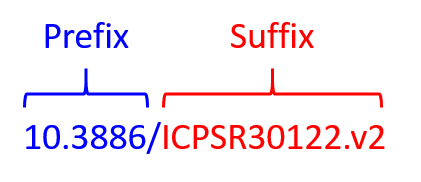Digital Object Identifiers (DOI) are unique strings of characters assigned to different kinds of research objects (articles, data, projects, files, etc.) that are made available in a digital environment. They are an important portion of metadata and, as a type of persistent identifier, ensure that the objects to which they are assigned are easy to locate online. A DOI is composed of a prefix (always starting with 10. and followed by four or more numbers), a slash, and a suffix.

Whenever you see a DOI like the one above, you can access the resource to which it is assigned by converting the DOI into a URL; you do this by putting “https://doi.org/” in front of it. In this case, https://doi.org/10.5064/F65Q4T1P takes you to a data project by Mainwaring and Pérez-Liñán on QDR. The DOI of an object does not change even when other information about the object, such as its URL, does. Accordingly, you will always be able to access a resource if you have its DOI. That’s why DOIs are increasingly common in citations. They are required by the Publication Manual of the American Psychological Association (APA Style), strongly recommended by the Chicago Manual of Style, and included in the suggested citations you see for all data projects in QDR.
The DOI system is under the management of the International DOI Foundation (IDF) and the individual DOI names are Registration Agencies. QDR uses the DataCite agency as part of the Global Dataverse Community Consortium (GDCC). The vast majority of DOIs in use today are assigned to scholarly articles. However, most trusted digital repositories provide DOIs for datasets and data projects. Those DOIs should be included in citations to those data, as they facilitate finding the data. DOIs also form a lasting link between published research and its underlying data. Also, citations with DOIs are counted in services like Making Data Count, the Web of Science data citation index, and other similar metrics, assuring that data creators receive credit for their work.